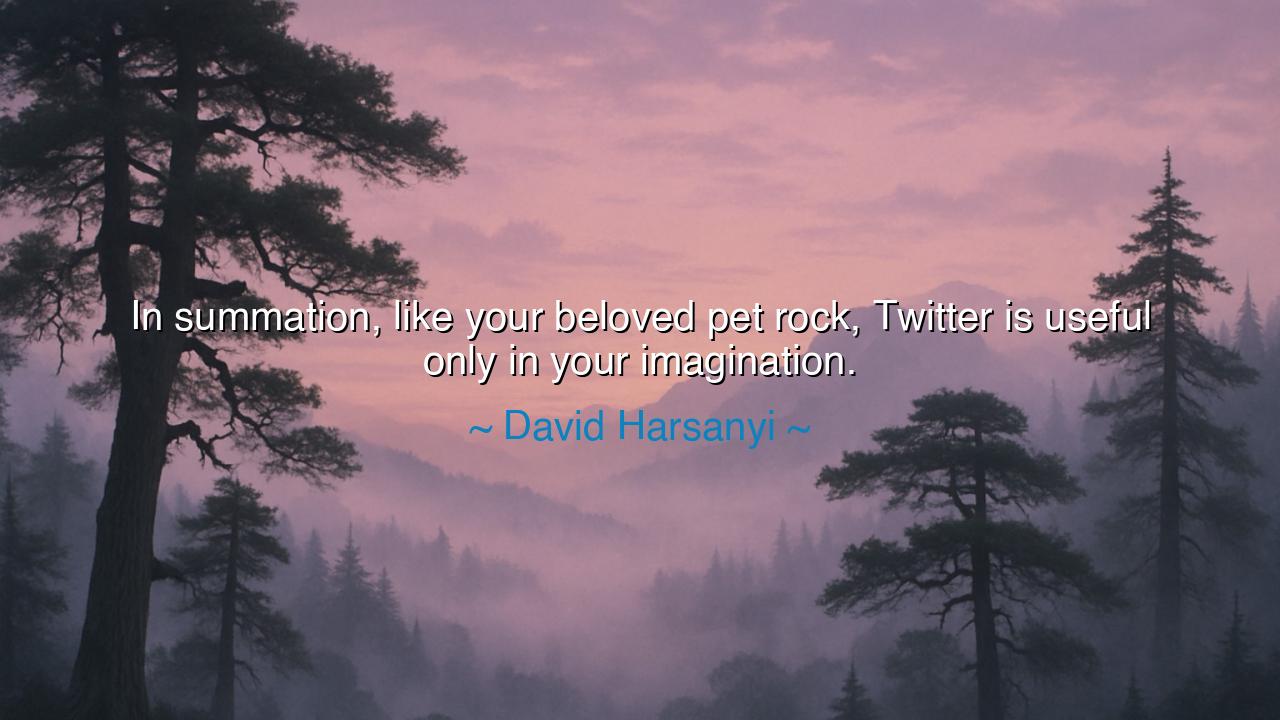
In summation, like your beloved pet rock, Twitter is useful only






David Harsanyi, with irony sharpened into a blade, once declared: “In summation, like your beloved pet rock, Twitter is useful only in your imagination.” At first, his words bring laughter, comparing a mighty engine of modern discourse to a toy stone that once sat on desks as a fad. Yet beneath the humor lies a warning for all ages: that not everything we worship as powerful, not every tool we raise to the heavens, holds true substance. Many things, like the pet rock, enchant us with novelty, stir us with illusion, but leave us empty-handed when their moment has passed.
The pet rock, that strange invention of the 1970s, was nothing more than a stone sold as if it were alive, dressed in a box with straw and humor. Its “use” existed not in reality, but in the imagination of its owner. People laughed, collected, and pretended, but at the end of the day, it remained what it had always been: a rock, inert, unchanging, without purpose. Harsanyi’s comparison strikes to the heart: so too, he suggests, is much of Twitter—a place where utility is less in truth or productivity, and more in the illusion of participation, of influence, of significance.
The ancients knew well this danger of mistaking shadows for substance. Plato warned in his allegory of the cave that men chained in darkness mistook shadows on the wall for reality itself. They argued and fought over images, forgetting that beyond the cave lay the sun. So too does Harsanyi’s observation remind us that the endless chatter of Twitter, the fleeting sparks of wit, outrage, and applause, may be no more real than shadows—convincing to the eye, but without weight in the world beyond.
History offers many parallels. Consider the tulip mania of seventeenth-century Holland, when flowers became tokens of speculation, sold for fortunes as if their petals could anchor an economy. Yet the frenzy was rooted not in substance, but in imagination. When the illusion collapsed, the tulips remained only as flowers, beautiful but unable to bear the weight of what had been projected onto them. In the same way, the noise of social platforms may feel like the roar of history, but when the moment fades, we are left with little but echoes.
Yet there is also sympathy in his jest. For though the pet rock was useless, it gave joy to some, and though Twitter may lack true permanence, it stirs the heart with amusement, with community, with the sense—however illusory—that one’s voice matters in the great conversation. The danger lies not in its existence, but in forgetting its limits, in mistaking the illusion for the whole of truth. To cling too tightly to shadows is to neglect the weight of real life: flesh, work, friendship, and deeds that endure.
The lesson, therefore, is not to despise Twitter, nor to laugh only at the pet rock, but to remember where true substance lies. Tools of imagination may entertain, may even inspire, but they must never replace the grounded labor of reality. Do not mistake the applause of strangers for the love of friends, nor the fury of arguments online for true action in the world. Hold lightly the illusions, and hold firmly the things that carry weight: truth, work, loyalty, and creation.
Practical action flows from this wisdom. If you find yourself lost in endless chatter, step away and return to the real. Plant something that grows, build something that lasts, speak to someone face-to-face. Use the tools of imagination for play, but anchor your life in what endures. In this way, you may enjoy the illusions without being consumed by them, and laugh at the pet rock without ever mistaking it for a living thing.
Thus Harsanyi’s quip, though born in satire, becomes a timeless teaching: Do not confuse the useful with the illusory, nor shadows with substance. The world is filled with pet rocks, dressed as treasures, but wisdom lies in knowing what is stone and what is seed. Remember this, and you will not be led astray by fleeting fads, but will walk upon the solid ground of truth.






AAdministratorAdministrator
Welcome, honored guests. Please leave a comment, we will respond soon